The MG Sports Car
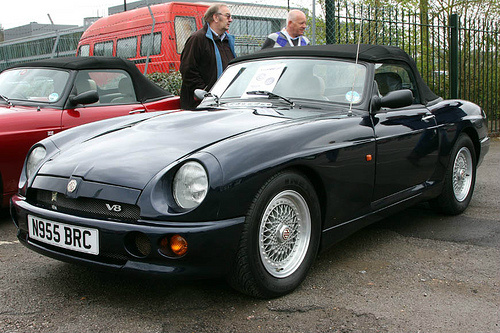
1995 MG RV8
from Classic to Modern
MG On The Track
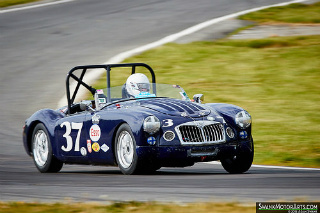
1959 MGA This gorgeous classic was driven by Dave Good during a Group 5 Race at the 2015 Jefferson 500. A 1.6 litre Mark 2 had a top of 101 mph and 0-60 in 13.7 secs. A sight to behold!
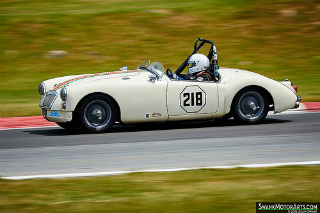
1959 MGA Another action shot of this classic, this time driven by Butch O'Connor during a Group 5 Race in the 2015 Jefferson 500. Really nice
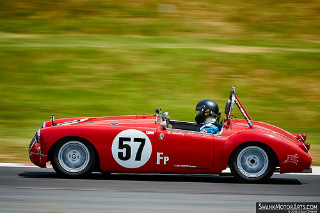
1957 MGA This impressive racer was driven by Brian Dolan during a Sprint Race for Group 5 as part of the 2015 Jefferson 500
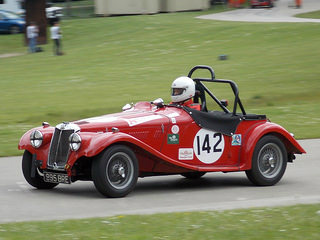
1954 MG TF This smart classic was seen at a track meting at Crystal Palace in 2015
The 1924-1953 MG
From the 1924 MG 14/28 to the 1955 MG TF Midget, see: The Early MG
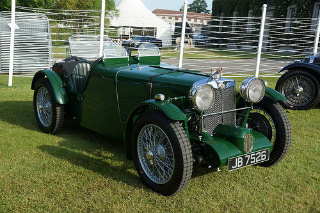
1934 MG K3 Magnette This immaculate 1933-34, 2-seater sports/racer used a supercharged 1087 cc S6 engine capable of 80 mph. It had a class win in the 1933 Mille Miglia race. Seen here prior to its entry in the 2015 Goodwood Festival of Speed
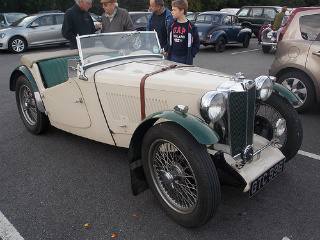
1946 MG TC This 1945-50 2-seater roadster used a 1.25 litre, OHV, straight-4, with a 77 mph top. This beauty was seen at a Classic Car Show in Kent. Off-white really enhances it
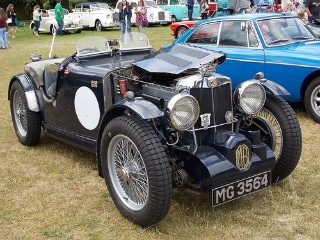
1934 MG K3 Magnette This beautiful shot was taken at the Purley Classic Car Show in Surrey. Note the number plate

1933 MG L2 Magna Fine shot of leisurely drive thru' the countryside
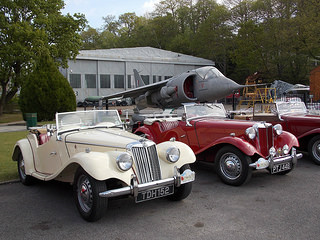
1954 MG TF and 1953 MG TD Entered in the MG Regency Run, this distinctive duo was spotted, with an impressive backdrop, at the Brooklands Museum
1955 MG TF 1500 A really well cared for example of this classic roadster
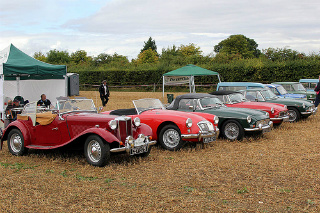
MG's on Parade This impressive line up was seen at the Shere Hill Climb in 2013
The MGA 1500
The MG sports car. In 1955, the MG T-series was finally phased out in favour of the MGA, which symbolised a styling breakthrough in respect of its predecessors.
The MGA 1500 sports car mounted a separate body to a rigid frame, and used a 1.5 litre, 4-cylinder engine with two carburettors.
It was a two door, two seater model, available as a convertible or fixed head coupe. There were drum brakes on all four wheels.
MGA 1500 Technical Data
Production: 1955-1959
Output: 58,750
Engine: 1498 cc
Four Cylinder, 72 bhp
Speed: 98 mph
Time to 60: 16.0 secs
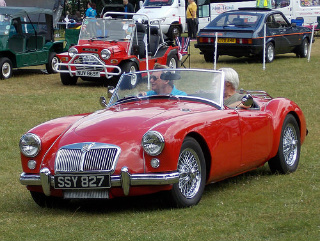
1957 MGA This eye-catching example, seen at the Purley Classic Car Show, was awarded "Best MG" at the show. No surprise
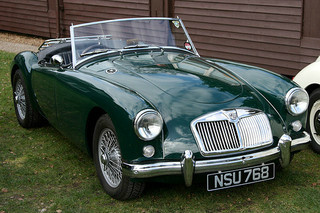
MGA 1500
Full Screen Full Screen
The MGA Twin Cam
In 1958, the MGA Twin-Cam sports car was introduced. It used a 1.6 litre, high compression, double overhead cam engine with an aluminium cylinder head.
It was an unreliable engine, which suffered from detonation problems and burning oil. A low compression version developing 100bhp was later added.
MGA Twin Cam Technical Data
Production: 1958-1960
Output: 2,111
Engine: 1588 cc
Four Cylinder, 100 bhp
Speed: 113 mph
Time to 60: 9.1 secs
1959 MGA Twin Cam Good to see a fine example of this somewhat rare classic
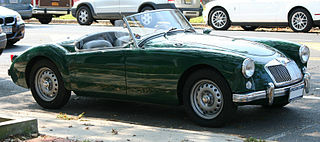
MGA Twin Cam
Full Screen
The MGA 1600
In 1959, the MGA 1500 had its engine uprated from 1498cc to 1598cc, and was now designated the MGA 1600 sports car.
Apart from minor changes to the trim, the two cars were similar, externally.
MGA 1600 Technical Data
Production: 1959-1960
Output: 31,501
Engine: 1598 cc
Four Cylinder, 78 bhp
Speed: 96 mph
Time to 60: 13.3 secs
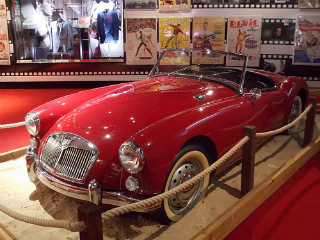
Elvis Presley's 1960 MGA 1600 Mk I Elvis drove this car in the 1961 film Blue Hawaii and was so impressed that he bought it from the film company for his own use
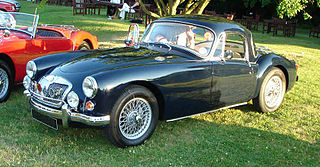
MGA 1600
Full Screen
The MGA 1600 Mark 2
Finally, in 1961, the MGA 1600 Mark 2 sports car was introduced.
It used a larger 1622cc engine, a higher back axle ratio for smoother high speed driving, and a grille that was inset.
MGA 1600 Mk2 Technical Data
Production: 1960-1962
Output: 8,719
Engine: 1622 cc
Four Cylinder, 93 bhp
Speed: 101 mph
Time to 60: 13.7 secs
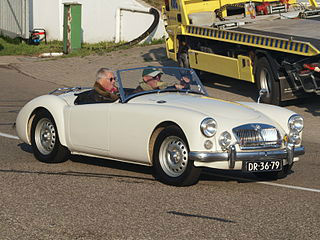
MGA 1600 Mark 2
MGA 1600 Mark 2 A really smart example in good company
Full Screen
The MGB Mark 1
The introduction, in 1962, of the MGB Mark 1 sports car, a two door, two seater convertible, represented a radical change in design.
It used a monocoque structure, instead of the body being attached to a chassis as was the MGA and MG T-types. The result was a more resilient structure. Later, in 1965, a 2+2 version was added.
It incorporated a 1.8 litre engine, with two SU carburettors, and a four speed gearbox. The suspension was softer for a smoother ride, and there was an optional overdrive unit.
MGB Technical Data
Production: 1962-1967
Output: 399,070
Engine: 1799 cc
Four Cylinder, 95 bhp
Speed: 103 mph
Time to 60: 12.2 secs
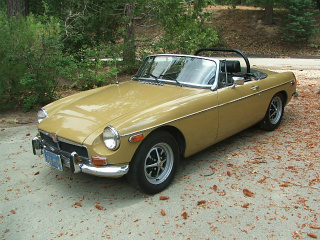
MGB Mark 1
Full Screen
The MGB Mark 2
Near the end of 1967, the MGB Mark 2 was launched following a number of technical changes, which included:
- A gearbox with synchromesh on all forward gears
- An optional automatic gearbox
- A new front grill
- The use of an alternator instead of a dynamo
- The addition of reclining seats
Otherwise, the specification and performance was as per the Mark 1.
Full Screen
The MGB Mark 3
Additional changes in 1972 led to the introduction of the MGB Mark 3. These included:
- A new facia
- The chrome bumper over riders being substituted by rubber one
Furthermore, US emission control regulations resulted in the power output being reduced to 84bhp.
This was the final version of the MGB, with production having ended in 1980 with nearly 90% of output being exported, almost exclusively to the US.
Full Screen
The MGB GT
In 1965, the MGB GT sports car was introduced. It had a fixed roof, and was marketed on the basis of its distinctive hatchback style.
It was, essentially, a 2+2 design combining a rear bench seat and substantially more room for luggage, compared with the roadster. The only difference was in the suspension with stiffer springs at the rear and the addition of anti roll bars.
In terms of performance, it was about 5mph faster than the roadster, due to its aerodynamic shape, but acceleration was marginally slower due to the increased weight of the rear section.
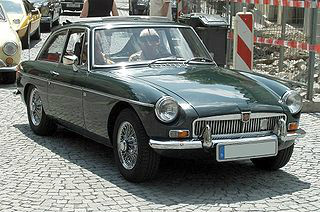
MGB GT
Full Screen
The MGC
In 1967, production of the Austin Healey 3000 was scheduled to end. Accordingly, a suitable replacement could involve adding its 2.9 litre, straight 6-cylinder engine into the MGB.
This heralded the birth of the MGC sports car, available in both GT and convertible variants. From the outside, the only difference between it and the MGB was a noticeable bulge in the front of the bonnet to allow for the relocated radiator.
The heavy engine and revised suspension had an adverse effect on the cars' handling, and was partly responsible for limiting its popularity.
MGC Technical Data
Production: 1967-1969
Output: 9,002
Engine: 2912 cc
Six Cylinder, 145 bhp
Speed: 120 mph
Time to 60: 10.0 secs
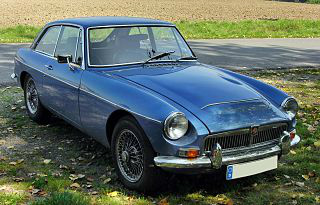
MGCGT
Full Screen
The MGB GT V8
In 1973, a more powerful version of the MGB GT was introduced. It was fitted with a Rover 3.5 litre, V8 engine, with an aluminium block and head, and two SU carburettors. It was designated the MGB GT V8 sports car.
Since this engine was lighter than the 1.8 litre MGB engine, it only required minor chassis changes, and handling was unaffected.
This model was never exported to the US.
MGB GT V8 Technical Data
Production: 1973-1976
Output: 2,591
Engine: 3528 cc
Eight Cylinder, 137 bhp
Speed: 125 mph
Time to 60: 7.7 secs
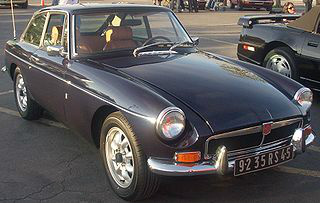
MGB GT V8
Full Screen
The MG RV8
In 1992, the original MGB underwent restyling with the addition of new body panels and a modified suspension.
At the same time, a new power plant was fitted in the form of a 3.9 litre version of the aluminium Rover 3.5 litre, V8 engine. The result was the introduction of the evocative MG RV8.
Unfortunately, it retained rear drum brakes and leaf spring rear suspension, and as such was regarded as old fashioned. Over 75 % of total production was exported to Japan.
MGB RV8 Technical Data
Production: 1993-1995
Output: 2,000
Engine: 3946 cc
Eight Cylinder, 190 bhp
Speed: 135 mph
Time to 60: 5.9 secs
1995 MG RV8 Using a 190 bhp, 3.9 litre, Rover V8, this 1992-95 beauty had a top of 135 mph with 0-60 in 5.9 secs
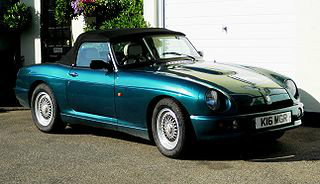
MG RV8
Full Screen Full Screen
.
see All My Reviews
Got any stories about Your Favourite MG Sports Car?
MG LINKS



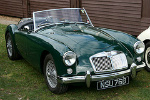






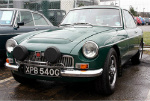


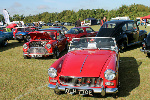
MG LINKS END
SPORTS CAR LINKS

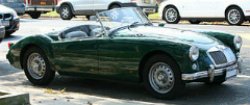



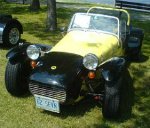








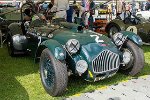
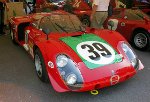


SPORTS CAR LINKS END
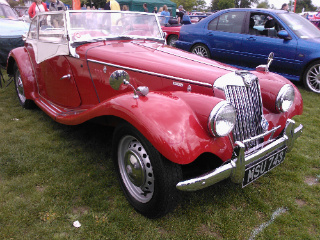
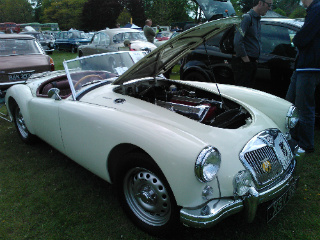
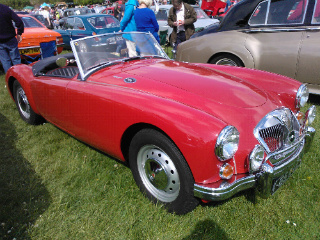
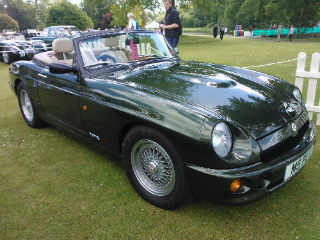
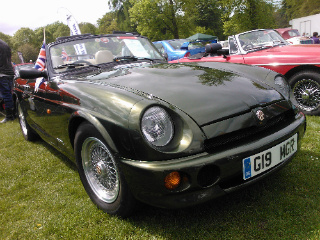






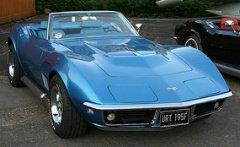
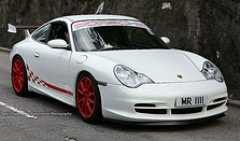
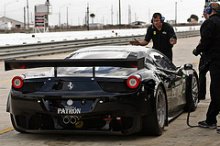
New! Comments
Have your say about what you just read! Leave me a comment in the box below.